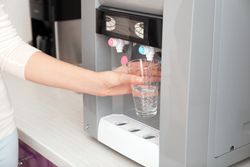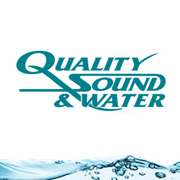Why You Need a Water Filtration System to Remove Chloramines

While the water that pours out of the kitchen tap in the office has been treated, this doesn't make it 100% safe to drink. In many instances, it still contains chloramines—disinfectants used to defend water against harmful organisms as they travel through the pipes to the building. Some employees might be sensitive or allergic to this chemical compound, but you can keep them safe by installing a water filtration system and using this guide to learn more.
Why Are Chloramines Used to Treat Drinking Water?
Drinking water typically undergoes two stages of disinfection before it reaches the tap. The primary disinfectant—usually chlorine, ozone, UV light, chlorine dioxide, or a combination—is applied at the water treatment site to remove harmful bacteria, viruses, and other organisms. However, these treatments—besides chlorine—tend to breakdown quickly.
To ensure the water stays protected as it travels through the pipes, a secondary disinfectant is applied. In most instances, chlorine or chloramines—a group of chemical compounds that contain chlorine and ammonia—will be added.
 Chlorine tends to be less stable and often produces more harmful byproducts. For this reason, more water treatment plants have made chloramine their choice secondary disinfectant.
Chlorine tends to be less stable and often produces more harmful byproducts. For this reason, more water treatment plants have made chloramine their choice secondary disinfectant.
What Happens When Chloramines Are Consumed?
There are three types of chloramines: monochloramine, dichloramine, and trichloramine. Monochloramine is typically used when treating drinking water. The other two compounds are usually reserved for treating swimming pools. However, it is not unheard of for facilities to use these compounds at lower concentration levels to treat drinking water. In most instances, skin, eye, and respiratory problems have been associated with the latter compounds.
While monochloramine isn't known to pose any health risks at the safe drinking level of four milligrams per liter, there are still those who are more susceptible to its presence. Also, any byproducts it does produce can cause long-term problems if ingested over an extended period.
Installing a water filtration system will protect your employees from future illnesses. An activated carbon filter system will absorb any remaining chloramines along with any harmful byproducts or other lingering contaminants, and a reverse osmosis system will ensure a clean, non-chemical taste.
Protect the health of your employees by contacting Quality Water & Sound in Hastings, NE, about their water filtration options. For over 40 years, this family-owned company has provided effective business solutions, including the installation of Pure Water Technology® drinking systems. Call them today at (402) 461-4935 for a quote on these products, and visit their website to learn more about their high-quality sound systems and security cameras.
About the Business
Have a question? Ask the experts!
Send your question

